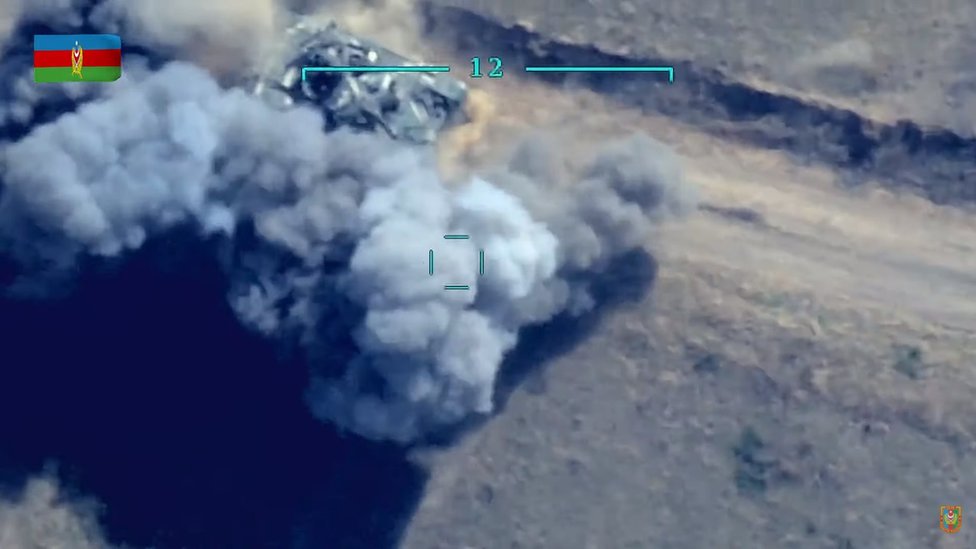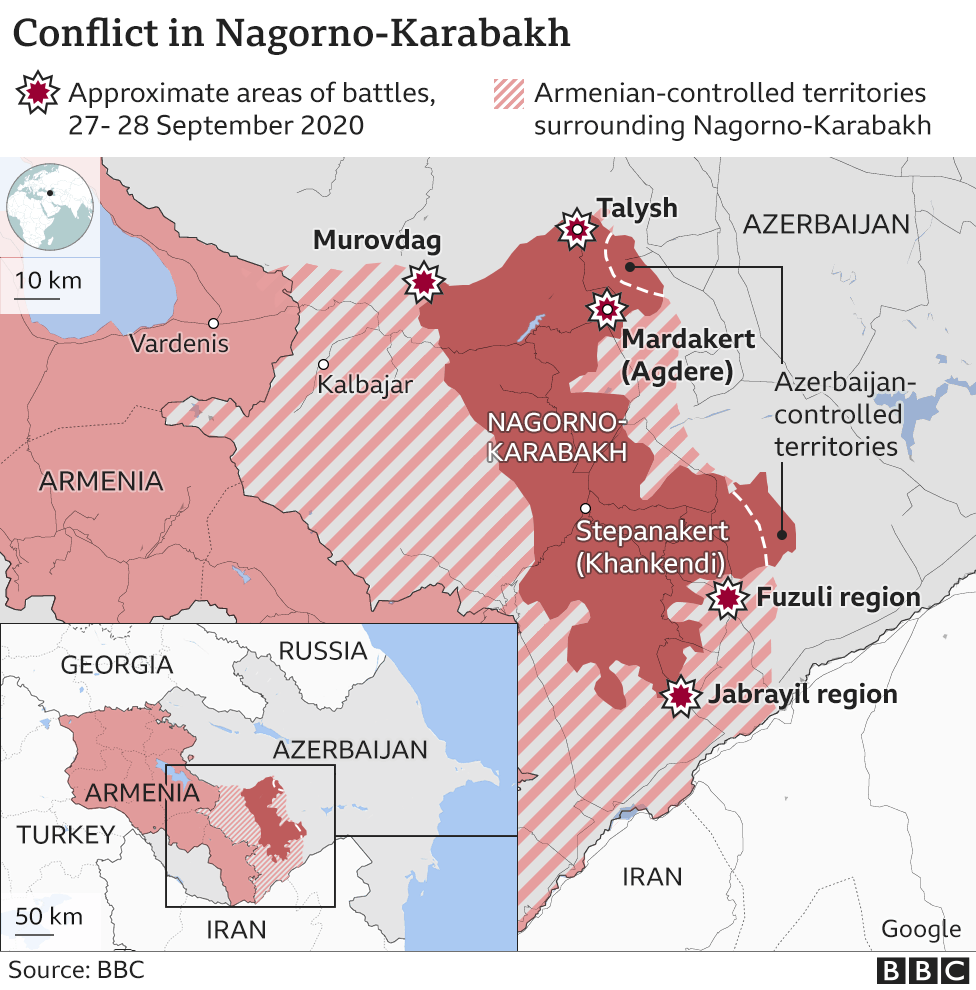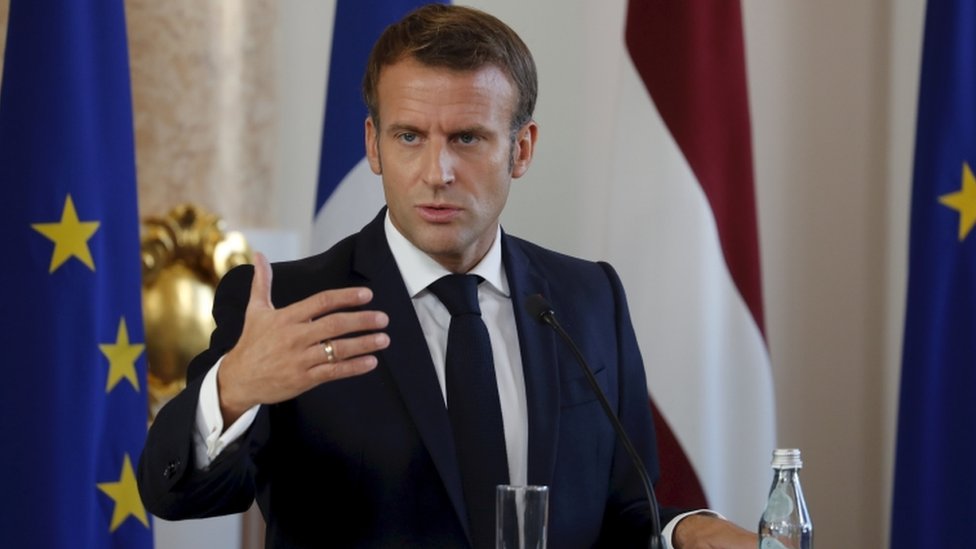Related Topics
Azerbaijan's president has vowed to fight on until Armenian forces leave disputed territory, on the fourth day of fierce fighting in the region.
"We only have one condition: Armenian armed forces must unconditionally, fully, and immediately leave our lands," President Ilham Aliyev said.
More than 100 deaths have been reported in the heaviest fighting in years over the Nagorno-Karabakh region.
Officially part of Azerbaijan, it is governed by ethnic Armenians.
The two former Soviet republics fought a war in 1988-1994 over the territory. Although Armenia backs the self-declared republic it has never officially recognised it.
It is unclear what caused the renewed fighting, which is the heaviest since the 1994 ceasefire, and there are growing fears international powers could be dragged into the conflict.
On Wednesday French President Emmanuel Macron said he was "extremely concerned by the warlike messages" coming from Turkey, a staunch ally of Azerbaijan.
Turkey says it is "fully ready" to help Azerbaijan recover the enclave.
Meanwhile, Armenia's defence ministry released a picture of an Armenian SU-25 jet it said had been shot down by a Turkish F-16 on Tuesday. Turkey has rejected the allegation as "cheap propaganda" and Azerbaijan says Armenia is lying about the cause.
And one fighter has told BBC Arabic he was recruited in northern Syria last week and sent via Turkey to fight in the conflict. Ilnur Cevik, an adviser to Turkish President Recep Tayyip Erdogan, dismissed the report as "completely unfounded".
What's happening on the ground?
Dozens of soldiers and some civilians have died since fighting broke out on Sunday.
Both sides accused the other of shelling across the so-called Line of Control, separating forces in Nagorno-Karabakh.
 image copyrightAzerbaijan defence ministry
image copyrightAzerbaijan defence ministryOn Wednesday, Azerbaijan published footage of what it said was the destruction of two "enemy" tanks and said an Armenian battalion had fled the area around Tonashen.
Armenian reports said three civilians had been killed in an Azerbaijani air attack on the town of Martakert in Nagorno-Karabakh. Armenian state news agency Armenpress said seven civilians and 80 service personnel had been killed since the fighting began.
Azerbaijan's prosecutor general announced on Wednesday that 14 civilians had been killed and 46 injured.


BBC Arabic, meanwhile, has spoken to one man who was recruited in northern Syria "to guard military points" on Azerbaijan's borders for $2,000 (£1,550).
Abdullah – not his real name – said he was flown to Azerbaijan via Istanbul with other Syrian men. They received no training, but were sent to Nagorno-Karabakh "wearing Azerbaijani uniforms" when fighting broke out.
"The car stopped and we were surprised to find ourselves on the front line," he said. "Then the bombing began, people were crying in fear and wanted to go home."
President Erdogan's adviser Ilnur Cervik called the accusation "a kind of disinformation campaign".
"We are not recruiting anyone. Where is the proof that we're recruiting these people along with the Syrian opposition sending them Azerbaijan [sic]? This is completely false," he said.
The Syrian Observatory for Human Rights reports that about 320 Syrian mercenaries have been transported to Azerbaijan by Turkish security companies. But they add that Armenian-born fighters in Syria have also been transported to Armenia to join the fight.
What's the international situation?
On Wednesday French President Macron warned Turkey about "warlike comments… which essentially remove any inhibitions from Azerbaijan in what would be a reconquest of Nagorno-Karabakh. That we will not accept."
Turkey is an ally of Azerbaijan, and even closed its border with Armenia in 1993 in solidarity over the Nagorno-Karabakh dispute.
France meanwhile has a large expatriate Armenian population. Mr Macron appeared to promise greater support to Armenia in the coming days: "I say to Armenia and to the Armenians, France will play its role."
The country is also a chair of the Organization for Security and Co-operation in Europe (OSCE) Minsk Group, created in 1992 to resolve the conflict between Armenia and Azerbaijan.
 image copyrightEPA
image copyrightEPAIn recent weeks Nato allies France and Turkey have been on opposite sides in a dispute over energy claims in the Eastern Mediterranean. They Read More – Source



/cdn.vox-cdn.com/uploads/chorus_image/image/65543002/bbc_logo_red.0.jpg)